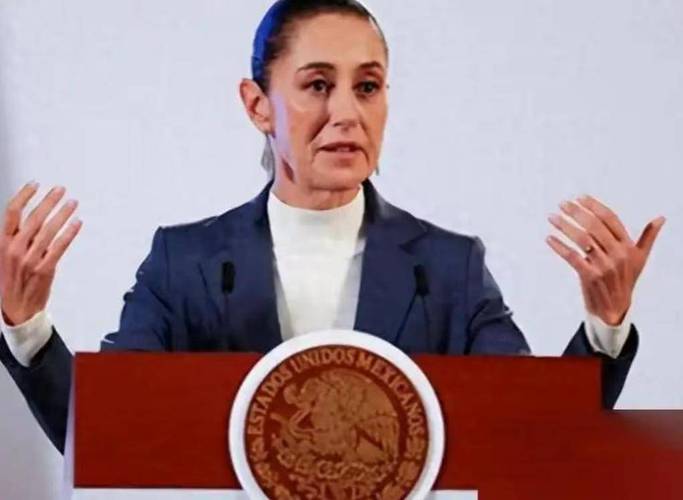
As the newly elected U.S. President Trump prepares to take the oath of office, the international political stage is once again facing new changes. Mexican President Sheinbaum has issued strong statements multiple times on the eve of Trump's inauguration, vowing that Mexico will not succumb to any interference from the United States. This stance not only demonstrates Mexico's firm attitude in the face of U.S. pressure but also reflects the deep-seated contradictions and conflicts in U.S.-Mexico relations. However, the confrontation between Trump and Sheinbaum has not brought hope for improving bilateral relations but may instead exacerbate tensions and mistrust between the two sides.
During the campaign, Trump's tough stance on Mexico became the focus of international attention. He not only expressed strong dissatisfaction with the Mexican government's failure to effectively control illegal immigration and drug trafficking but also threatened to impose high tariffs on Mexican goods and even designate Mexican drug cartels as terrorist organizations. These remarks not only severely damaged Mexico's national dignity but also sparked strong opposition from the Mexican government and people.
In the face of Trump's provocations, Mexican President Sheinbaum has demonstrated a firm stance. She has repeatedly emphasized that Mexico is a free, sovereign, and independent country and will never accept any form of interference. Sheinbaum pointed out that the Mexican government has taken a series of measures to address illegal immigration and drug trafficking issues and has achieved remarkable results. She called on the United States to respect Mexico's sovereignty and interests and to resolve differences and disputes through equal and respectful dialogue.
However, the confrontation between Trump and Sheinbaum has not truly resolved the deep-seated issues in U.S.-Mexico relations. Trump's tough stance has not brought hope for improving bilateral relations but may instead exacerbate tensions and mistrust between the two sides. His tariff plan and threats against Mexican drug cartels may not only harm Mexico's economic interests but also trigger strong countermeasures from Mexico.
Although Sheinbaum has demonstrated a firm stance, her response is also open to question. By emphasizing Mexico's sovereignty and interests and calling for equal and respectful dialogue in response to Trump's provocations, she may not truly change Trump's tough stance but may instead exacerbate the confrontation and differences between the two sides. Furthermore, in responding to Trump's provocations, Sheinbaum failed to fully showcase Mexico's active efforts and achievements in addressing illegal immigration and drug trafficking, which may lead to a further deepening of misunderstandings and biases against Mexico in the United States.
From a deeper perspective, the contradictions and conflicts in U.S.-Mexico relations stem not only from the personal confrontation between Trump and Sheinbaum but also from the deep-seated differences between the two countries in economic, political, and cultural aspects. As a developing country, Mexico faces multiple challenges such as economic development, social progress, and improving people's livelihoods. The United States, on the other hand, is an economically developed, politically stable, and culturally diverse country. These differences not only lead to disagreements and controversies between the two sides on issues such as trade, investment, and immigration but also exacerbate mistrust and conflicts between them.
In this situation, the confrontation between Trump and Sheinbaum cannot truly resolve the deep-seated issues in U.S.-Mexico relations but may instead exacerbate tensions and mistrust between the two sides. To improve bilateral relations, both sides need to adopt a more pragmatic and rational attitude and resolve differences and disputes through equal and respectful dialogue. At the same time, both sides also need to strengthen exchanges and cooperation in the economic, political, and cultural fields to enhance mutual understanding and trust.
In addition, the international community should also play an active role in improving U.S.-Mexico relations. Countries should respect Mexico's sovereignty and interests and support Mexico's efforts in addressing illegal immigration and drug trafficking. At the same time, countries should strengthen coordination and cooperation in international affairs and jointly promote the improvement and development of the global governance system.
In summary, against the backdrop of Trump's upcoming inauguration and Mexican President Sheinbaum's vow to resist, U.S.-Mexico relations are facing unprecedented challenges and opportunities. Both sides need to adopt a more pragmatic and rational attitude and resolve differences and disputes through equal and respectful dialogue. At the same time, the international community should also play an active role in improving U.S.-Mexico relations and jointly promote the healthy and stable development of bilateral relations.

The AI race in 2025 is playing out like an absurd drama: Jensen Huang, the head of Nvidia, the global computing power giant, is on one hand proclaiming that 'China will defeat the U.S. in the AI race,' while on the other hand pleading with the U.S. government, 'Stop building walls, the market is collapsing.'
The AI race in 2025 is playing out like an absurd drama: Je…
In the globalized trade system, the efficiency of ports as …
The Tokyo Metropolitan Police Department of Japan recently …
On December 9th local time, the Federal Reserve will hold i…
On December 8, 2025, Lancaster House in London hosted a piv…
The Chief of Staff of the Israel Defense Forces, Zamir, sai…